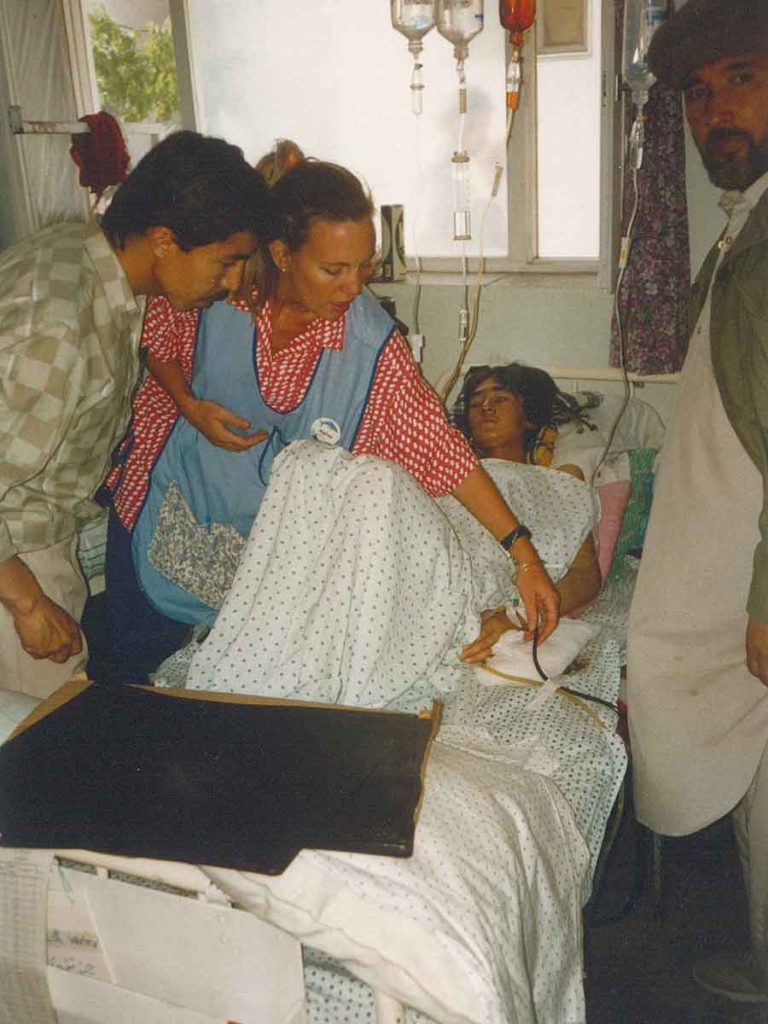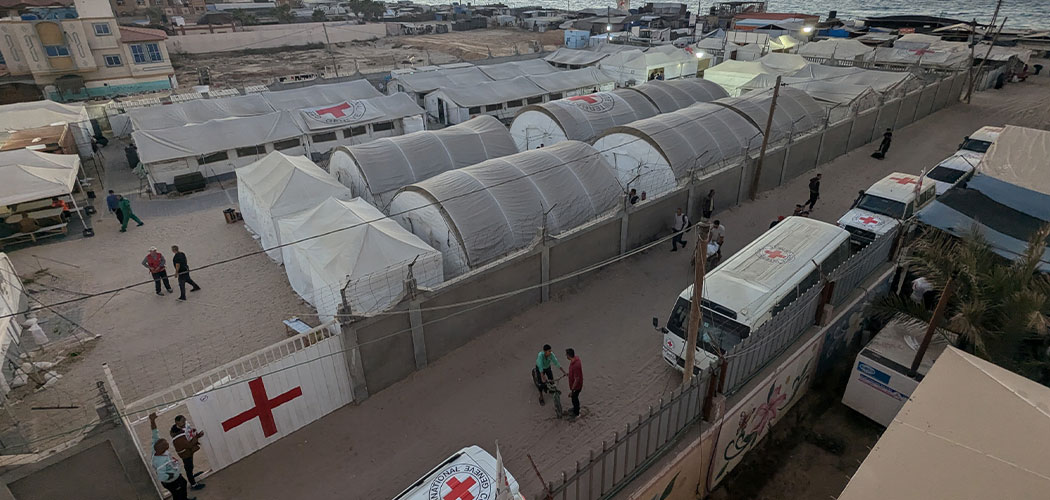When Andree Girardau finished her nursing studies, she knew she wanted more than a standard hospital career.
“So, I worked remotely, lived up in Cairns, built up my skills – and then I saw an advertisement for international work.”
What came next would change her life. It was the early 1990s, and after an interview with the International Committee of the Red Cross (ICRC), she received a call asking if she would be interested in going to Afghanistan as a ward nurse in a surgical war hospital.
Andree didn’t hesitate.
She spent three intense months in Kabul, nursing hundreds of war-wounded civilians during the fall of the Najibullah regime.
“It was full-on conflict,” she recalls. It was the beginning of nearly a decade working in some of the world’s most devastating conflicts – Cambodia, the Congo, Rwanda, Bosnia, Kosovo.
Later, she was offered a role with Australian Red Cross to recruit health professionals and build the structures that support them. “It was a great opportunity to develop systems for health and psychosocial support for delegates.”
Her approach was shaped by experience. “When you’ve worked in conflict yourself, you understand the context, you understand what’s needed,” she says. “It’s because of this experience I was passionate about developing support for staff.”
Psychosocial support was still an emerging concept in humanitarian work in the 1990s. Andree helped build partnerships with psychologists and mental health providers to prepare delegates before deployment, support them during their mission, and check in after they returned. “We were ahead of our time,” she says. “Now there’s much more focus on psychosocial wellbeing – but back then, we were building it from the ground up.”
Additionally, Andree says the care doesn’t stop with the delegates themselves. “It extended to their families. “We talk to all our delegates about having honest conversations before they go. It’s essential. Because when something appears in the media – images from a warzone – their loved one might be there. And that can be incredibly distressing.”
Red Cross offers psychosocial support for families too. “If your mum is worried, or you’ve got children – our psychologist will speak with them if they wish. We use Mandala Support Services, a team of psychologists who understands the demands of this work.”

Andree explains that providing this service is crucial to the longevity of delegates wanting to continue in this field of work. “That’s what makes people want to keep doing this work. That’s what makes it sustainable,”
Andree describes a typical day for one of her delegates, currently stationed in South Sudan. “She’s up early, taking anti-malarials, eating breakfast, heading out to the hospital after a morning security briefing – green light to go. She’s working as a ward nurse alongside national staff, providing care, mentoring, training, learning so much herself. It’s a long, busy day.”
And sometimes, the work is even more complex. “She can also join mobile teams – flying into areas where fighting is more intense. They land on airstrips, triage, evacuate patients, treat the wounded on-site. We used to do a lot of that, and it’s becoming more common again.”
There’s always an element of risk. “It’s calculated. Red Cross manages risk incredibly well, but yes – it’s something you must understand and accept when you go.”
Andree doesn’t shy away from describing the most confronting moments. “At times, it was the sheer volume of war wounded. So many people, so many horrific injuries. You’re triaging, you’re choosing who gets treated first, who might not make it. That is deeply confronting – especially when families are involved. Or when you’re in active warfare yourself, and you’re being taken to a bunker. That’s incredibly hard.”
“And then there’s the impact on your national colleagues. You go home to safety at some point. But they’re losing family members. Their homes are destroyed. And yet, they come to work every day. One of our nurses said, ‘My husband died last night.’ And there she was, still showing up to care for others.”
Andree says there is such a strong commitment to care in many of the communities they work in. In some countries, nurses haven’t been paid in months. Ministries of Health are decimated – and yet, they go to work.
Despite the hardship, the rewards have been immense. “Working with an organisation with strong values and incredible resources – that’s what makes the difference.”
Red Cross operates under seven fundamental principles, and that ethical foundation sets it apart. “Neutrality and impartiality are non-negotiable. We work on all sides of the conflict – always. In Kosovo, in Bosnia, I was moving through enclaves on both sides. In Jerusalem and Gaza – we work everywhere. We’re not there to take sides. We’re there to deliver care.”
That neutrality also supports local health systems. “We’re not there to replace national staff. Quite the opposite – we’re there to support and protect them so they can keep doing their work.
Recruitment now faces new pressures. “We need professionals with the right skills – but also languages like Arabic, French, Spanish, Russian. That’s hard to find in Australia. And with more emphasis on localisation, there are fewer opportunities for Australians to gain international field experience.”
Despite this the Australian Red Cross maintains a register of 100 delegates of elite humanitarian professionals who can be deployed internationally within 24 hours of a crisis.
To ensure Red Cross has the right delegates, candidates are deeply screened into their backgrounds to ensure they pose no harm to the communities they work in. They are also prepared with psychological screening, safety and security training and preparedness.
Deployments can range from war zones to helping communities build capacity after crisis such as earthquakes and cyclones.
Andree stresses this work isn’t for everyone, but for the right people it can be life changing. Red Cross is currently looking to recruit experienced nurses and midwives – but it’s not simply about signing for one mission.
“We’re looking for people who are ready to contribute to multiple deployments over time,” says Andree. “We need candidates who already have experience working in countries requiring humanitarian support.”
That kind of field readiness is critical. It’s not just a one-off adventure – it’s a long-term commitment to global care, says Andree.
To find out more about the positions click on the links below.
Operating Theatre Nurse (international humanitarian register) – Career portal
Midwife (international humanitarian register) – Career portal








